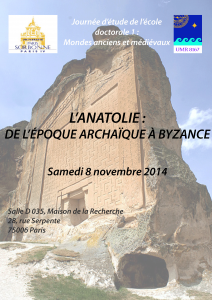 La journée d’étude de l’école doctorale 1: Mondes anciens et médiévaux de l’université Paris-Sorbonne aura lieu le samedi 8 novembre 2014 à la maison de la recherche, rue Serpente (Paris VIe) en salle D035.
La journée d’étude de l’école doctorale 1: Mondes anciens et médiévaux de l’université Paris-Sorbonne aura lieu le samedi 8 novembre 2014 à la maison de la recherche, rue Serpente (Paris VIe) en salle D035.
Le programme en pdf ici
Voir également le site de paris sorbonne
Programme
09h00 Accueil des participants
9h30 Markus EGETMEYER
François LEFÈVRE
Giusto TRAINA
Introduction
Session 1 : Échanges et interactions linguistiques en Anatolie.
10h30 Sarah BERNARD
« Sur les traces des alphabets anatoliens : entre emprunts et innovations. »
11h00-11h15 Pause Café
11h15 Milena ANFOSSO
« Le phrygien: une langue balkanique perdue en Anatolie. »
11h45 Florian RÉVEILHAC
« Inscriptions officielles et inscriptions privées en Lycie : le statut du grec et celui du lycien. »
12h15 Anahide KÉFÉLIAN
« Les inscriptions romaines d’Arménie : aperçu des interactions entre l’Anatolie romaine et le Royaume d’Arménie. »
12h45-13h15 Discussions
13h15-14h30 Repas
Session 2 : Construire l’Histoire : l’Anatolie et ses sources.
14h30 Germain PAYEN (Universités de Laval/ Paris-Sorbonne)
« La guerre d’Eumène II et ses alliés contre Pharnace (182-179 a.C.). Problèmes et lectures géopolitiques des suites du traité d’Apamée. »
15h00 Alexis PORCHER
« La Pisidie de Strabon : enjeux et problèmes. »
15h30-15h45 Pause café
15h45 William PILLOT
« La cité d’Ilion et le koinon d’Athéna Ilias : identité civique et culture régionale en Troade. »
16h15 Anaïs LAMESA
« Le territoire cappadocien : entre perceptions et réalité. »
16h45 Simone PODESTÀ (Université de Gênes/ Paris-Sorbonne)
« Histoire de la Lycie : les rapports entre les fragments historiographiques et les autres sources historiques. »
17h15-17h45 Discussions
17h45 Guy LABARRE (Université de Franche-Comté, EA 4011)
Conclusion

